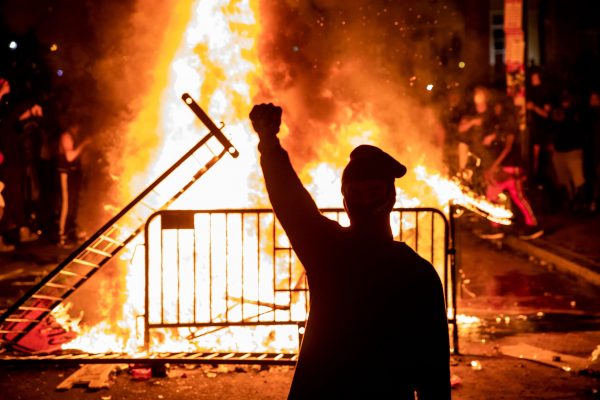America's young people are miserable and angry. Universities are to blame.
King’s Woke Usurpers

Campus MLK Day celebrates radical violence
The January commemoration of the life of Martin Luther King Jr., which started as a day, has now become a full week on most campuses, and may soon colonize the entire month of January. Colleges and universities, including the one at which I am employed, Bucknell University, are gearing up for this year’s activities. One trendline is clear to those who have been paying attention: every year, by any reasonable measure, the political and moral tenor of the activities that take place ostensibly to commemorate the legacy of the slain activist and preacher becomes more and more radical.
I have been taking careful ethnographic notes on the process here at Bucknell for a number of years now. Announcements that caught my eye went up this month just before the start of the Christmas break for a featured speaker and a reading group devoted to her recent book. Her name is Valarie Kaur, and the title of her book is See No Stranger: A Memoir and Manifesto of Revolutionary Love.
I have not had the time yet to procure a copy of the book, but I did find several lengthy videos of her speaking about the topic in its title. In one such talk that I found on YouTube, “What Does Revolutionary Love Look Like?”, she makes clear that Revolutionary Love begins in thinking of oneself as an object of constant hostile aggression based on one’s minority ethnic origin and religion (Kaur’s family are Sikhs from the Indian subcontinent). This view of self is to be passionately embraced no matter how much need be omitted or warped in an accounting of the external world to make that victim narrative work.
Kaur lugubriously describes having to wrap her two-week old son “up in blankets and hold him in my arms in the cold month of February and take him to his first vigil, mourning the lives of three Muslim students shot execution-style in the head in Chapel Hill, North Carolina.” This was a shattering experience, she mournfully intones, that made it clear that someone like her is in constant, grave danger merely by virtue of her identity from wicked others who despise that identity. “I…couldn’t…breathe,” she nearly sobs.
Everything in her account of this 2015 crime implies that these victims were singled out because of their religion or race or both. But this is not true. The Department of Justice under Attorney General Eric Holder, during the tenure of President Barack Obama, determined that there was no basis for a hate crime finding in these killings. The murderer, Craig Hicks, shot the three victims in an ongoing dispute over vehicle parking near their residence. Hicks had charged the victims with taking up more parking spaces than their condominium rules allowed. No evidence was uncovered that his act was motivated by anti-Muslim or racist sentiment.
Kaur offers none of this easily located information about the Chapel Hill case. It does not fit her Revolutionary Love narrative. Factual accuracy is not Valarie Kaur’s main concern. And the power of the narrative rests solely on her emotionally overwrought demeanor in delivering a series of claims that are either unverifiable or spun in a demonstrably mendacious way.
Valarie Kaur’s worldview may be inconsistent with reality, but it is perfectly attuned to the ideological tendency of MLK Week in the contemporary world of higher education. Last year, my university invited Opal Tometi, one of the founders of Black Lives Matter, an organization that openly invokes the spirit of convicted murderer and political terrorist Assata Shakur as an inspiration. In 2019, they brought Ibram X. Kendi, one of the country’s highest-profile hucksters of racial resentment, who claims America is deeply white supremacist yet who has at least once publicly shown in bumbling fashion that he must know his claim is undermined by empirical evidence.
Six years ago, Bucknell invited Nyle Fort, a writer and minister who has explicitly endorsed violence as a morally proper act in the context of the Black Lives Matter movement’s activities. In an essay titled “Strange Fruit, Revolutionary Violence, and a Love on Fire,” Fort wrote,
I argue that under conditions of white supremacist terror, revolutionary violence can be an expression of Christian love…Black theology does not ask whether violence is right or wrong, good or evil, Christian or unchristian. It asks how are blacks to respond to the institutionalized violence already at work in our lives. Presenting nonviolence as the only possible Christian response to racial terror is not only unreasonable, but unrighteous…How are we to love our white neighbor whose existence is paid at the expense of our suffering? According to Cone: “If the riots are the black man’s [sic] courage to say Yes to himself, then violence may be . . . the only expression of Christian love to the white oppressor”…Christian love is the blackpower to say No! to white supremacist terror, even if saying No to racial terror means saying Yes to revolutionary violence.
Revolutionary violence is not only not un-Christian, it is an expression of love. Perhaps then revolutionary violence and revolutionary love are not so far from one another? Perhaps they are in fact one and the same? Fort and Kaur find common cause in the spiraling insanity of the racial justice movement in America.
Fort, like Tometi and many other such figures, also positively invokes the terrorist murderer Assata Shakur, one of the chief heroes of the BLM movement. Shakur penned the chant that BLM protestors frequently intone at their meetings:
It is our duty to fight for our freedom.
It is our duty to win.
We must love each other and support each other.
We have nothing to lose but our chains.
This mantra is usually recited in a call and response fashion, with increasing cadence and volume.
Shakur, born JoAnne Byron, and now legally bearing the last name Chesimard, is a bizarre and frightening figure from the most extreme and terroristic wave of the American radical movements of the late 1960s and early 1970s. She was a member of the Black Liberation Army, an offshoot of the Black Panther Party that went still further than the militant Panthers in advocating armed attacks on the American establishment.
In May of 1973, she and several of her associates were stopped by New Jersey State police, whereupon they initiated a shootout with the officers. One trooper was wounded, and one was killed. Chesimard/Shakur was found guilty of the first degree murder of Trooper Werner Foerster. She was subsequently broken out of prison by revolutionary comrades and is currently living in Cuba, still on the FBI’s most wanted list.
Shakur has been very clear in an autobiography she wrote after her prison break and in other statements that she strongly embraces violence as a legitimate method for challenging what she sees as a slave system in the United States (she has referred to herself as an “escaped slave”). Here is a representative quote from her book: “When Black people seriously organize and take up arms to fight for our liberation, there will be a lot of white people who will drop dead from no other reason than their own guilt and fear.”
Revolutionary violence is an expression of revolutionary love, and revolutionary love articulates itself through the demonization of its victims. This is the twisted fabric of the current racial justice movement. Shakur casts revolution as “r/evolution,” where bloodshed and violence is masked by an appeal to harmony.
r/evolution means respecting and learning from your children. r/evolution is beautiful.
r/evolution means protecting the people. the plants. the animals. the air. the water. r/evolution means saving this planet.
r/evolution is love.
In his Nobel Prize acceptance speech of December 10, 1964, King presented his view on the relationship of love to truth: “I believe that unarmed truth and unconditional love will have the final word.” One day later, in his Nobel lecture, he gave the audience a word on violence too: “Violence as a way of achieving racial justice is both impractical and immoral.”
With the contemporary willful confusion of revolutionary love and revolutionary violence, we are a long, long way indeed from the spirit of the man we claim to be celebrating every January.
The American Mind presents a range of perspectives. Views are writers’ own and do not necessarily represent those of The Claremont Institute.
The American Mind is a publication of the Claremont Institute, a non-profit 501(c)(3) organization, dedicated to restoring the principles of the American Founding to their rightful, preeminent authority in our national life. Interested in supporting our work? Gifts to the Claremont Institute are tax-deductible.
The animating principle of Wokeness is self-destructive navel-gazing.
Suppression of speech and political activity from the usual sources



